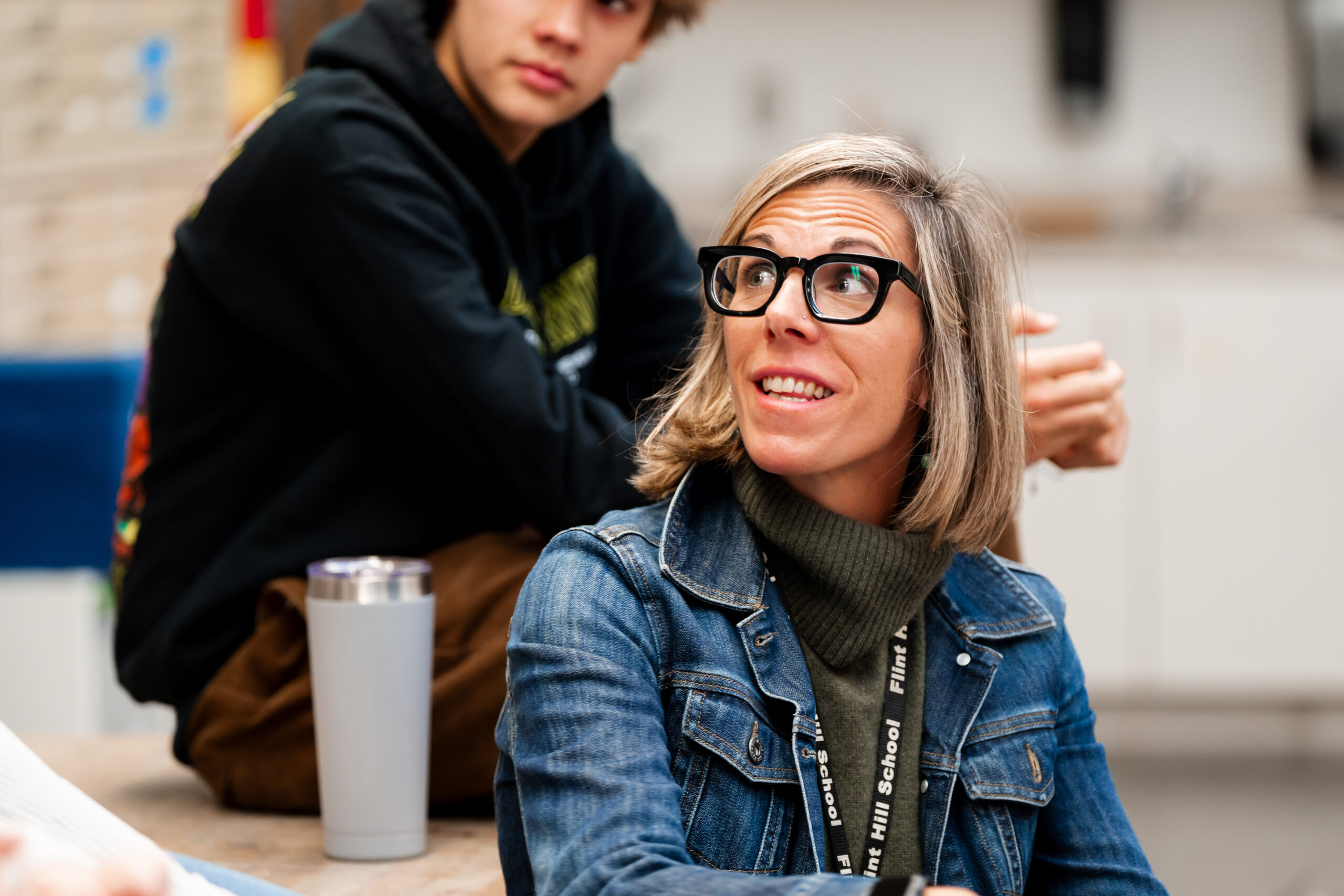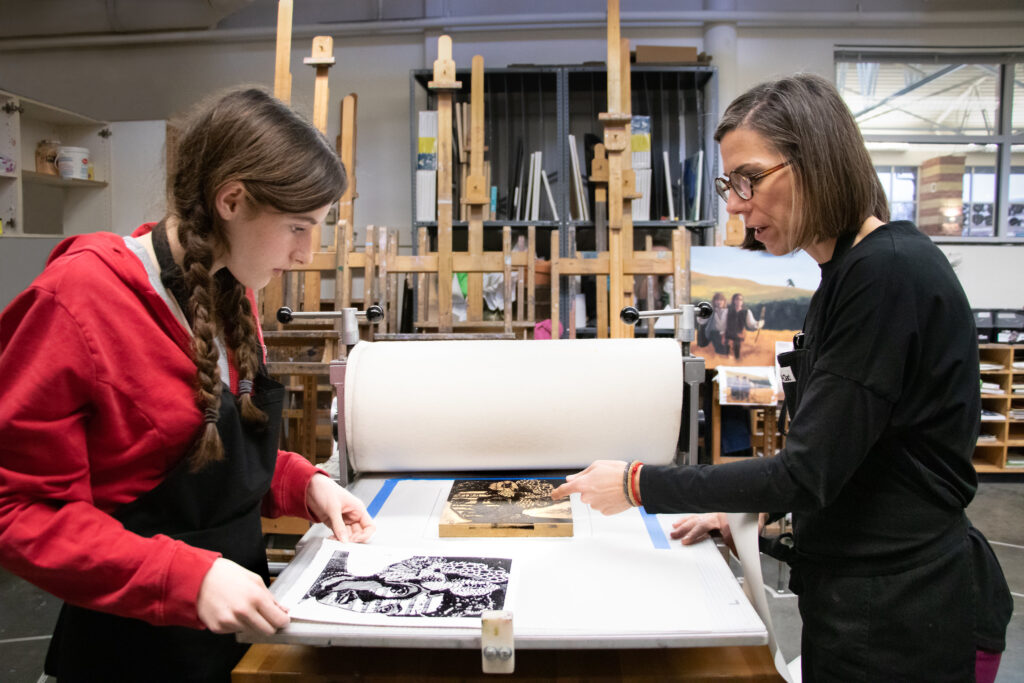LEARN MORE ABOUT FLINT HILL
HUSKY HIGHLIGHTS

August 18, 2022
Written by Flint Hill Admission Team
Teacher Spotlight: Nikki Brugnoli, Upper School Art
If you visit the Upper School campus, you can’t miss our Art classrooms. They’re brimming with easels, canvases, pottery wheels and both finished and in-progress works. Art Teacher Nikki Brugnoli tells us what it’s like to guide Flint Hill students through the creative process and why art plays a crucial part in educating young minds.
What do you love about teaching art?
I am a practicing studio artist, so teaching the thing that I do just makes sense. I love that I can teach the students to think creatively and critically. I can teach them how intersectional and experiential art is, and that it's really a part of our everyday life and culture. It's not just something that's limited to a studio nor is it just a painting on a wall.
What do you enjoy teaching about the Upper School age range?
I taught only college students for the first 12 years of my career. So what I love about my shift to teaching high school is that I'm getting them right at the very beginning, and I have an opportunity to really open doors and create connections. The most influential person in my young life was my high school art teacher. The idea of being able to pass that on and pass that forward is a pretty exciting and powerful opportunity.
You're getting these students right when their identity is really just starting to take its shape, and they're figuring out what questions to ask about who they are. And as artists, we do that all the time. Part of being an artist is being introspective and examining the world critically and really observing the things around us. To be able to do that intentionally is pretty awesome.
The way I teach this program, you know, if a student knows that they want to go to art school in their freshman year, we start building a plan for success for wherever they decide they want to go. I think I have a rare opportunity as an Upper School teacher to work with a student for four years. I really get to see the full development of high school students from their freshman year to their senior year. And to see that development through a creative lens is even more powerful.

Do you find that your students come in as freshmen and then just get more assured and aware of themselves as artists?
That's the goal, right? And so, if I'm successful, then yes. For me, a measurement of my success as a teacher is “Are they growing? Is their self-confidence growing? Is their intellectual curiosity growing?” If so, I like to think that I have some hand in that development. And that's why I teach. That's why I love it. I love teaching a student or a person how to ask questions. Questions are good. They make life so much more interesting.
Even when you’re in a field that’s more business-oriented, it’s really nice to have that creative training to fall back on.
Of course, like creative problem-solving. Sometimes you have to convince a parent that their encouragement of their child to go to art school is not planless, it’s not visionless. Most corporations want creative thinkers and critical thinkers, and a lot of times those companies are looking for artists as somebody who can really think out of the box, break down barriers, really challenge an institution or a situation to think differently. Especially in this cultural moment that we're in where we need to engage in that critical space all the time. I mean, that's the measurement of who we are as humans or Americans or all of those things, right now; the awareness of where we are in our bigger global environment.
What do you think sets Flint Hill apart from other schools?
One thing that's very unique is that I've been given the autonomy to create the strongest program that I can and that I desire to create. Our resources are bar none. I don't think you can really compare what we can provide for our students. Even teaching at a university, there's always a fight for a budget. I feel like that's not generally a problem that we have.
When you have the resources, it just means you can think bigger. If I have a student who wants to work on six-by-six-foot paintings — I didn't ever get to work on six-foot paintings until I was a senior in college. I was buying my own supplies! But here, it’s “What do you want to do? Let's figure out how to do it.” That's the coolest thing. “I think you have an idea. Let's run with it. Let's figure out how to mine it and build it and grow it and blow it up and then put it back together and see what’s new.”
It’s a feeling of not necessarily a limitless horizon, but maybe it is a limitless horizon, at least within the art department.
And my kids are awesome. I have just extraordinary, smart, bright, curious kids. I don't know that everyone can say that they teach really engaged, awesome, caring, compassionate humans every day. But I know that I do.
You know, that's the kind of space that I've created. I think students know that when they come in here, that's expected of them. They can be totally uniquely themselves. That's something as a teacher I strive for. I know that as a school, that's something we strive for, that we blaze our own trails. We really kind of hold on to those core values. We have an opportunity to really impart and teach those values to the young minds that we are raising to move out into the world.
Most of the students I talk to here say that the teachers are the best. So the students are equally excited.
Yeah, they're just awesome. I had to adjust my expectations and adjust so many things when I shifted from college to high school. I had to adjust the content. But I've never had to adjust my intellectual curiosity. I can push an Art I student to the same level of rigor as I could to a Drawing I student who's a freshman in college and producing the same quality, if not for some of them, a higher quality. They are curious and they work really hard and they're very, very driven. So that's what I get to work with every day. And that's pretty awesome.
LEARN MORE ABOUT FLINT HILL
Fill out the form to receive updates from our team.
RECOMMENDED FOR YOU
Director of the Upper School Don Paige shares six key pieces of advice he wishes parents knew before their students start high school.
A VAIS committee completed its 10-Year Accreditation Visit in April 2024. The committee reported its immediate findings in this short presentation to faculty and staff.
Our Upper School Dean of Students talks about leadership opportunities that are available to students in grades 9-12 at Flint Hill.
How do you tell if a potential middle or high school will be challenging enough academically while also prioritizing student health and wellness?






